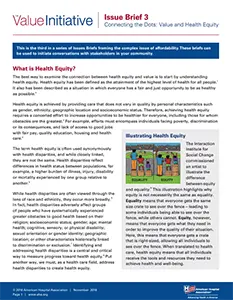From the American Hospital Association: The best way to examine the connection between health equity and value is to start by understanding health equity. Health equity has been defined as the attainment of the highest level of health for all people. It also has been described as a situation in which everyone has a fair and just opportunity to be as healthy as possible.
Health equity is achieved by providing care that does not vary in quality by personal characteristics such as gender, ethnicity, geographic location and socioeconomic status. Therefore, achieving health equity requires a concerted effort to increase opportunities to be healthier for everyone, including those for whom obstacles are the greatest. For example, efforts must encompass individuals facing poverty, discrimination or its consequences, and lack of access to good jobs with fair pay, quality education, housing and health care.
The term health equity is often used synonymously with health disparities, and while closely linked, they are not the same. Health disparities reflect differences in health status between populations, for example, a higher burden of illness, injury, disability or mortality experienced by one group relative to another.
While health disparities are often viewed through the lens of race and ethnicity, they occur more broadly. In fact, health disparities adversely affect groups of people who have systematically experienced greater obstacles to good health based on their religion; socioeconomic status; gender; age; mental health; cognitive, sensory, or physical disability; sexual orientation or gender identity; geographic location; or other characteristics historically linked to discrimination or exclusion. Identifying and addressing health disparities is a central and critical way to measure progress toward health equity. Put another way, we must, as a health care field, address health disparities to create health equity.
Click here to view the report.





